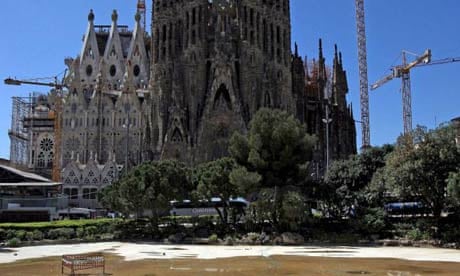The tanker Sichem Defender arrived at the port of Barcelona yesterday carrying something far more precious than its usual cargo of chemicals.
Nearly 23m litres of drinking water - enough for 180,000 people for a day - was the first delivery in an unprecedented emergency plan to help this parched corner of Spain ahead of the holiday season.
As the country suffers its worst drought since records began 60 years ago, Catalonia, of which Barcelona is the capital, has been the worst-hit region. After months without adequate rainfall its reservoirs are down to just over a quarter of normal capacity. A year ago they stood at almost double that.
Nationally, reservoirs are around half full with the worst of the summer heat just a few weeks away.
If levels drop to 15% of normal supply the water in the reservoirs is no longer deemed fit for drinking and restrictions on tap water would have to be brought in.
The tanker, which arrived in Barcelona from nearby Tarragona, will be followed by its sister ship Contester Defender tomorrow from Marseille.
At a cost of €22m (£17.5m), six shiploads are to arrive each month for three months, from Tarragona in southern Catalonia, Marseille and Almeria - one of the driest areas of southern Spain.
Already Barcelona's authorities have turned off civic fountains and beachside showers, brought in hosepipe bans, and banned the filling of swimming pools. Schoolchildren are being taught how to save water.
"We are only too aware of the crisis with the water as they have been giving my daughters classes for months on how to save water and only to use what they need," said city resident Begoña Gómez, 43, as she sipped a glass of bottled water. "But we need better management of water by the government."
As the reservoirs across Spain run dry, a "water war" has broken out, with different regions scrabbling for extra supplies.
The Socialist government, which initially opposed water transfers from one region to another, executed a political U-turn and allowed water to be pumped into Catalonia from the river Ebro in the neighbouring region of Aragon.
The move infuriated southern regions such as Murcia and Valencia, which asked for similar concessions. Both are significant agricultural areas, with a busy tourist season about to start, and expect their water supplies to be hit hard.
Both areas, run by the opposition conservative Popular party, claim Spain's Socialist prime minister José Luis Rodrìguez Zapatero denied their requests for water transfers for political reasons.
The Socialist government is following a controversial programme of building desalinisation plants, which they claim will provide a long-term solution to Spain's endemic water shortage. They have built six so far and plan a further 18. One is due to open outside Barcelona in May next year.
Meanwhile, despite heavy rainfall over the weekend water reserves in Catalonia only increased by 1.7%.
Water experts say Barcelona's problems are not just down to low rainfall. They claim an antiquated, leaky drainage system loses millions of litres of water a day throughout Spain. Within metres of the new €130m headquarters of Agbar, which owns Aguas de Barcelona, the city's water utility, one faulty system was reported to be losing 800,000 litres a day.
Ramón Llamas, a water expert at Madrid University, says Spain squanders its water and needs better soil management, adding that despite having one of the lowest amounts of rainfall in western Europe, it has one of the highest levels of water consumption a head: the average person in Madrid uses 140 litres a day.
Meanwhile, despite fears taps would run dry this summer in Barcelona, the arrival of water tankers did not please everyone.
Miguel Angel Fraile, secretary general of the Catalan Commercial Confederation, said: "The arrival of a water ship is the image and expression of failure which neither Barcelona nor Catalonia deserves."
And others doubted whether emergency measures were necessary. Carlos Urquiaga, 36, manager of La Tramoia restaurant, said: "No one here asks for water from the tap because the taste in Barcelona is so bad. We always serve bottled water and everyone buys it for their homes."
Who exports where
Hydrologists expect the demand for water will continue to increase with the world's growing population. Some predict that by 2025, 3.5 billion people will be living in water-scarce countries, compared with 500 million in 2002.
· Turkey exports water to Israel and plans to ship more to Syria, Jordan and Greece
· France sends tankers filled with millions of gallons of water to Algeria
· Russia, New Zealand, Norway and Scotland have all considered exporting water
· Malaysia provides most of Singapore's water
· Islands in the Caribbean ship water by tanker to help with shortages
· A plan by Canada to ship 1m gallons of water a day to the Middle East was dropped after protests by environmentalists
